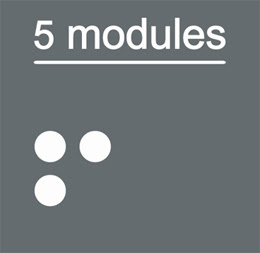 Ryu
Hankil, Jin Sangtae, Taku Unami, Mattin - 5 Modules III
Ryu
Hankil, Jin Sangtae, Taku Unami, Mattin - 5 Modules III
Manual
I'm
a little late to this extraordinary recording, having owned it a while
but only just found the time to play it. However as Mattin's partially
incomprehensible sleeve notes suggest we all need to reclaim our own
notion of time, this probably doesn't matter so much. Time is
definitely a central theme of this CD. Ryu Hankil is credited with
playing clockwork with a contact mic, and for much of the recording the
listener is removed from any preconceived notions of how time is used
in improvised music, left with broken parts of a strangely unfamiliar
clock ticking, long silent spaces and periodic long passages of
electronic drone that do not allow for any flow, yet also somehow also
avoid tension. There seems to be little connection between the sound
events that occur, and whilst the rhythmic turning of odd deconstructed
clockwork-like sound features throughout the piece there is little
symmetry to the overall construction that jumps viciously from pin
pricks of sound dropped into silence to brittle blasts of digital noise.
I'll
be honest I don't know what to make of this CD. It falls somewhere
between the emptiness of some of Unami's past music and the raw, dirty
electronic sound that is becoming synonymous with the fast emerging
Korean improv scene. In places the use of mutated clock ticking and
subdued laptop hum produces some interesting shapes picked out of the
silence, but in other places the harshness and sheer volume of a drone
and the overall ugliness of the sounds used make this a
difficult listen. Here and there we are presented with long passages of
repeated sounds that resemble the recordings of clockwork slowed right
down, each "tick" extended into a rougher sound event. By all accounts
Unami heavily edited and reworked the live recording in post
production, and its possible these passages are the result of him
slowing the music down, again playing with the notion of time. Its also
possible that one or both of the laptops are responsible for producing
these sounds in real time. There is a definite sense of uneasy
imbalance thoughout however, caused in part by this feeling of slowed
time.
The music is improvised but there has had to have been
some considerable discussion about the shape of the music beforehand.
On another sleeve note Hankil mentions that he gained a lot from the
musical relationships formed between the quartet, which can be divided
into two established duos (Unami/Mattin and Hankil/Sangtae) meeting for
the first time. The odd, fractured feel of the entire 55 minute piece
resembles more a Radu Malfatti score played with broken electronics
than it does an improvisation, and it seems unlikely that this music
was arrived at without either some degree of predetermined approach or
massive post production treatment. If this music is indeed the result
of four musicians playing together and discovering common ground then
it is remarkable that they have all arrived here in this strange
unorthodox place.
So a CD that has really got me thinking, the
kind of challenge we are used to from Mattin and Unami. I can't help
but feel I am missing something important here, something that has
caused this music to take such an alien, uncomfortable form. Its miles
from easy listening, an intriguing mystery at best, downright
impenetrable at its worse, but a disc that has certainly got me
thinking hard about its nature, and wondering what on earth I am meant
to do with it. Challenging stuff, in the very best sense of the word.
w.m.o/record label
desetxea net label
www.mattin.org
Uncertain Times
Bagatellen
Ryu Hankil/Jin Sangtae/Taku Unami/Mattin - 5 Modules III

Manual
The third release on this intriguing label out of Korea is an
improvised quartet though the innocent listener could be forgiven for
hesitancy in ascribing either of those two terms. As member Ryu Hankil
(clockwork, contact mic) writes in his liners, there’s certainly a
composed-sounding feeling to the single, 55-minute piece (divided into
11 five minute tracks, presumably to enhance airplay possibilities).
Additionally, its overall sparseness seems, superficially, to have
possibly emanated from a single individual, not four. But neither is
the case as Jin Sangtae (laptop, radio), Taku Unami (laptop) and Mattin
(laptop) are on hand as well.
In his brief accompanying notes, Mattin dwells on perceptions of time and one of the obvious components of the recording is the near metronomic rhythm of many sound elements which are churned out in slow, mechanical precision. The other salient feature is how “empty” the soundscape in which they’re tick-tocking is. Its sublimation level might approximate that of MIMEO’s “sight”, a work with which I found myself making comparisons even though their methods of construction are vastly different. The “interruptions” here are more aggressive, even at times strident, but there’s at least the surface aspect of tension in the wait between occurrences. The timepiece nature of many of the sounds almost necessarily conjures a semi-paranoid feeling and when, on a couple of occasions, a loud complex drone emerges, often in startling fashion causing several jumps in the chair, I was thinking in terms of systems failures, misalignments in the otherwise regular, if only rarely heard, rote temporal progressions as delineated by the ticking. In fact, the more one hears the piece that way, the more dystopian it becomes.
More concretely, one does wonder what, if any, strictures were in place during the performance. It’s a fascinating direction, in any case. Ryu Hankil writes, “This could be consumed as music, but it makes me think of something different than that. I still cannot say what it is.” Good question, but causing the listener to think is reward enough for the time being.
Posted by Brian Olewnick on August 12, 2007 7:30 AM